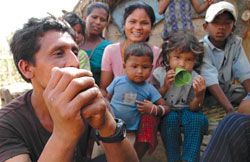 As the bus hurtled down the East-West Highway I tried desperately to apply some semblance of order to my racing thoughts. As we entered Rapti Zone and passed the barren landscape of the inner tarai, involuntary memories swarmed around my head.
As the bus hurtled down the East-West Highway I tried desperately to apply some semblance of order to my racing thoughts. As we entered Rapti Zone and passed the barren landscape of the inner tarai, involuntary memories swarmed around my head.
The scent of ripening mangos and the luminous green of the rice fields. Suddenly the name of the eldest daughter of the family that I lived with, a name I had been trying to remember ever since arriving again in Nepal, came back to me: Sumila. Images and feelings long dormant came back to life.
Dang is not the first place that comes to most people's mind when they think of Nepal. It has been a Maoist stronghold and Ghorahi was the first place where the Maoists attacked the army in November 2001.
That was when I was here last, volunteering with Student Partnership Worldwide teaching English and environmental education. The people and culture of this part of the country would leave an indelible impression on me. The family that I lived with for five months and the school and community in which I worked, are what brought me back.
After three years of university and two years struggling in London as a freelance photographer, I've finally made it back to Dang. Back to the heat and the parched terrain, back to the vibrant colours and the most generous people on the planet.
I didn't know what to expect as the bus pulled into Ghorahi. As I checked into my room at the Rapti Super Lodge, I was both relieved and a little disappointed to find it in the same state as when I used to stay here occasionally five years ago. My room is like a sauna, fully equipped with a painfully slow-moving fan whose motor generates more heat than the cooling power of the blades.
About 20 minutes out of Ghorahi is the Tharu community of Syani Ammapur. The Tharus are landless, and looked down upon by neighbouring communities. When I ask Geg Bahadur Thapa, the community leader, to tell me about the problems the families here face everyone laughs. "We have all the problems," he says, "We have no water, no toilet, not enough food to eat, none to sell, we cannot clothe ourselves or our children and we cannot send them to school."
The adults are uneducated but acutely aware of the need for education. The thought that their children will be no better off than them is clearly very painful. I ask them about the Maoists. These are the people, after all, that the Maoists are fighting for. I am met with a surly silence and some harsh looks. "We don't know anything about the Maoists," says Geg Bahadur.
Five years ago I had stumbled across a Maoist meeting and was forced to stay there all day in case I notified the authorities. Nowadays in Dang you don't stumble upon a Maoist meeting, you follow crowds of thousands. On the third day of my stay last month, the Maoists held a program attended by up to 200,000 people.
I ask some of the young people there what their feelings are towards the Maoists and am met with surprising indifference. "We are here because it's something to do," says 23-year-old Raju Panthi. "I don't support everything that the Maoists say, but at least they are saying something," he adds. Sankalp from Ghorahi refused to come with me to the rally and is far less enthusiastic. "I hate them," he says, "they are terrorists. They have done nothing good for our people, only killed them."
I wish I could say that loktantra has brought new hope to the people of Dang. But I couldn't see it. All the people I spoke to gave me a funny smile when I suggested that things now are really going to change. The young people especially seemed sceptical, with no faith in their politicians or the mechanics of democracy. Older businessmen also didn't foresee things changing for the better. Everyone is focused on the here-and-now, deeply suspicious of anything the Maoists have to say.
Seeing the family I lived with again and visiting the school that I taught at after so many years brought back a whole string of highly charged feelings. The vibrancy, warmth and generosity of both the people and the place have stayed the same.
The mountains are what bring people to Nepal and I love the mountains. They are where my head belongs. But my heart? My heart belongs to Dang.
www.joshlustig.com


